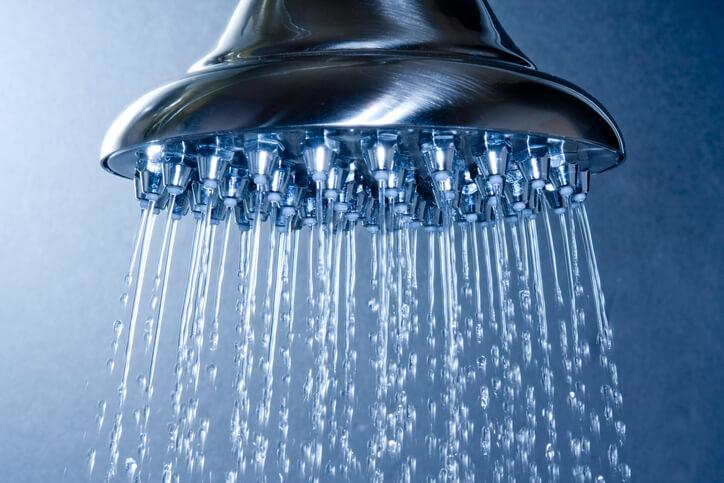If you spot some mold growing on your shower curtain or door, you're surely grossed out enough to do something about it—and fast. But if you're like most people, you rarely stop to wonder about the bacteria in your shower that you can’t see.
Plenty of products—like Shower Clear and EndoSan, among others—claim to protect you from the potentially dangerous gunk growing inside that otherwise nondescript fixture. But are they necessary? Should you really worry that your shower will make you sick?
The short answer: probably not.
"Showerheads are great places for microbial life to persist in the home," admits Matthew Gebert, research technician in the Fierer Laboratory at the Cooperative Institute for Research in Environmental Sciences at the University of Colorado in Boulder, where he's part of the Showerhead Microbiome Project, a study of what's living inside showerheads across the country. After all, showerheads are damp and warm, and whatever lives inside them gets replenished with nutrients each time you shower. (Here are 6 mistakes you're making every time you shower.)
"Bacteria are great at sticking together—literally—and creating little communities inside your showerhead," Gebert says.
They may not sound like neighbors you want, and there is chance that some of them could make you sick. Nontuberculous Mycobacteria (NTM) is a bacteria that occurs naturally in water and soil but has also found its way into plenty of showerheads. While many of NTM’s 150+ species are completely harmless, others can cause severe lung infections, particularly in people who have a weakened immune system. (Pick up healthier habits and get smart advice delivered straight to your inbox—.)
Another bacteria in your showerhead could be Legionella pneumophila, which is responsible for Legionnaire's disease, a type of pneumonia. It can be sprayed out in tiny amounts that make their way into your respiratory system.

Prevention Premium: The Weird Way Skipping Your Next Dental Cleaning Will Increase Your Risk Of Pneumonia
Still, these are worst-case scenarios. Most of the time, bacteria in your showerhead is well, just harmless bacteria. Aaron E. Glatt, MD, chairman of the department of medicine at South Nassau Communities Hospital in Oceanside, New York, an infectious disease specialist and spokesperson for the Infectious Diseases Society of America, doesn’t see any reason to worry. "Bacteria by definition," he says, "doesn't mean dangerous."
"Many [bacteria] are actually beneficial and serve to help boost a healthy immune system," adds Gebert. "People are exposed to bacteria every day—in dust, in the air, in food, through contact with other people, contact with their pets, their workspace—and very little of it actually makes you sick." Just because there are bacteria living in your showerhead "does not mean you are at an elevated risk for lung or skin infections," says Gebert. "Nor does it mean you need to throw away your showerhead today."
Still, it can't hurt to follow a few common sense rules:
www.boelke-art.de/Getty imagesSwitch to a metal showerhead.Studies show that bacteria are more likely to accumulate in plastic fixtures.
Clean regularly.Nothing complicated here: Just keep your showerhead (as well as your tub and shower curtain) visibly clean, recommends Glatt. Home guru Bob Vila suggests occasionally scrubbing nozzles with an old toothbrush, then detaching the head and rinsing the filter. Or you can fill a sturdy plastic bag with vinegar, a natural disinfectant, then attach it securely over your showerhead. Let it soak for an hour, then remove the bag and run the water to flush. (Here are 6 other things you should be cleaning way more than you do.)
Just remember: No product or technique can completely eradicate all germs from your shower fixture, says Glatt. And after a few days, the little critters will be back again.
Be picky about public showers.If you're grossed out by the appearance of a showerhead, don't use it. The same goes for the stall itself. "You shouldn't be going into a shower that's visibly soiled, especially with blood or feces," Glatt says. You're at an even higher risk of picking up bacteria in a dirty stall if you have an open wound or athlete's foot.
Put things in perspective.The water coming out of your showerhead is no different than what's coming out of your sink faucet, Glatt points out. Any bacteria you get in your mouth, eyes, or ears during a shower is probably not going to hurt you, unless there's an outbreak of bacteria in your area or you have a serious health issue.
If your immune system is compromised, you might consider skipping showers and taking baths instead. This will lessen the chances of any bacteria—dangerous or not—being sprayed into your nose or mouth. Just remember to clean your tub and anything in it (like a non-slip mat) often.